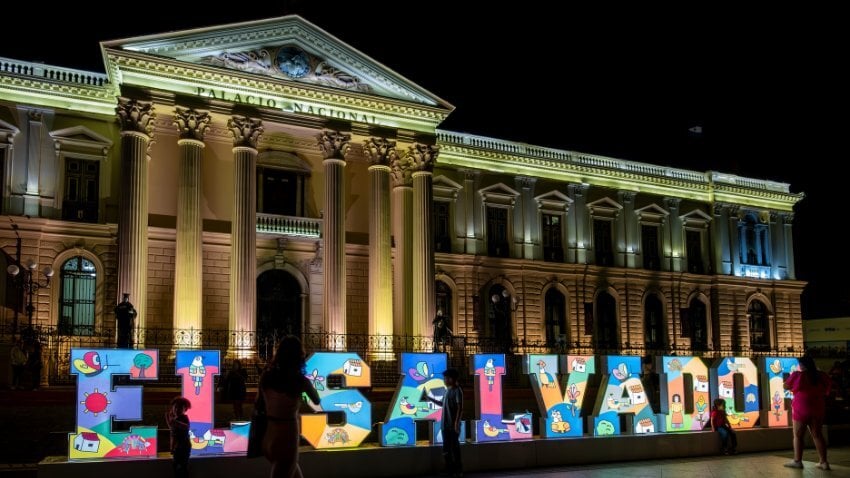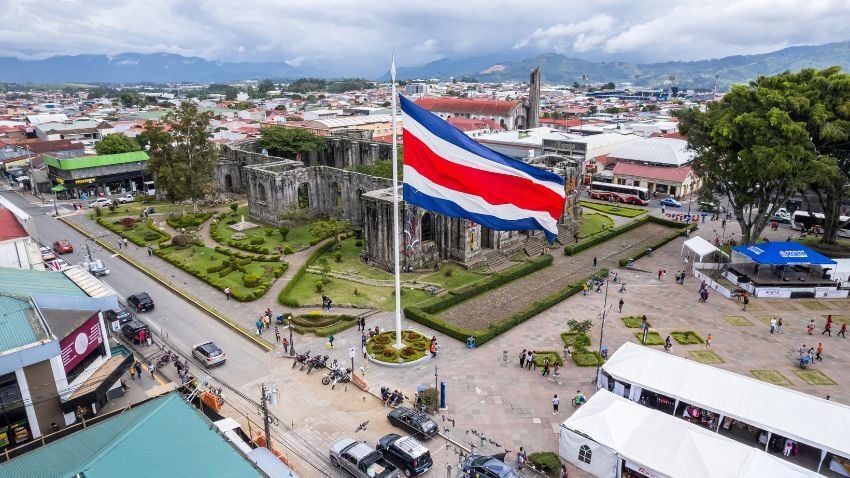Latin America’s Rightward Shift Continues In Honduras
Honduras’ newly elected president, Nasry Asfura of the conservative National Party, was sworn in on January 27, 2026. The election, held on November...

6 min read
A decade ago, El Salvador was known as one of the most dangerous countries in the world. In 2015, it had the world’s highest homicide rate. Gangs ruled the streets, and violence was part of daily life.
Today, a different story is being told. El Salvador is now one of the safest countries in Latin America, perhaps the safest. Tourists are coming back, families walk around at night, and expats are moving in.
What changed in El Salvador? The first name that pops up is President Nayib Bukele. Love him or hate him, his bold and controversial policies turned the country around.
In this article, we will examine closely who Nayib Bukele is and how El Salvador achieved one of the most dramatic safety transformations in recent history.
Born in San Salvador in 1981, Nayib Bukele isn’t your typical Latin American president. A businessman-turned-politician, he started as mayor of Nuevo Cuscatlán (2012–2015) and later the capital, San Salvador (2015–2018). He gained popularity by improving public spaces, promoting transparency, and communicating directly with citizens, especially through social media.
In 2019, he broke the country's long-standing two-party dominance and won the presidency. By 2024, he was re-elected with 83.14% of the vote, one of the most decisive victories in the region’s democratic history.
Bukele is bold, polarizing, and unapologetic. He governs with the confidence of a tech CEO, tweets like a millennial, and enforces policy like a general. He is socially conservative, economically pragmatic, and fiercely nationalistic. Critics call him authoritarian. Supporters call him a saviour. Either way, he redefined leadership in the region.
El Salvador has experienced a dramatic improvement in safety due to President Bukele's aggressive anti-gang policies. Central to this transformation is the Territorial Control Plan, initiated in 2019, which increased military and police presence in high-crime zones to combat gang violence.
The most controversial yet impactful measure was the State of Exception, declared in March 2022, which allowed for mass arrests and the suspension of certain constitutional rights. As of early 2025, over 85,000 people have been detained, many without formal charges. While this move significantly weakened gang operations, it raised concerns about arbitrary arrests and a lack of due process.
To support this crackdown, the government built the Terrorism Confinement Center, a massive prison with a capacity for 40,000 inmates. Judicial reforms were enacted to expedite legal proceedings, impose harsher penalties, and establish special courts for gang-related crimes. Additionally, Bukele’s administration has used AI surveillance technology to monitor gang activity, although details about these systems remain largely undisclosed.
Despite international criticism, many Salvadorans support these measures, crediting them with restoring peace and safety. Thanks to these sweeping changes, El Salvador is now considered a safe place.

Before Bukele, El Salvador was ruled by gangs. The state had lost control, and fear shaped daily life for millions who lived under extortion, violence, and lawlessness
Before Bukele took office, El Salvador was a country suffocated by violence, corruption, and hopelessness. From the end of its brutal 12-year civil war in 1992, the country struggled to rebuild its institutions, but never fully recovered.
In the power vacuum left by war, gangs rose to prominence. With the mass deportation of Salvadoran criminals from the United States in the 1990s and 2000s, violent organizations like MS-13 and Barrio 18 entrenched themselves across the country. These gangs didn’t just operate in the shadows; they openly controlled neighbourhoods, imposed “taxes”, enforced curfews, and resolved disputes with executions.
Entire communities lived under gang rule, with local authorities either unable or unwilling to intervene. Public buses were burned if drivers refused to pay extortion fees. Shopkeepers closed down for refusing to cooperate. Teenagers were recruited or killed. Families were forced to flee the country or send their children away, hoping to keep them alive.
The state had lost control. Police were underfunded, demoralized, and often infiltrated by organized crime. The judicial system was slow and corrupt. Politicians from both major parties — ARENA and FMLN — made deals with gang leaders to maintain political power. These so-called “truces” allowed violence to fluctuate temporarily, but at the cost of legitimizing criminal rule.
Public trust was gone. People believed the government couldn’t protect them, and in many cases, they were right. Ordinary citizens avoided speaking openly, especially in gang-controlled zones. There were areas where even the police dared not enter. For many Salvadorans, fear was part of daily life.
The international press regularly portrayed El Salvador as a war zone. Migration to the U.S. soared. The country was losing its youth, its middle class, and its future.
One of the most frequently asked questions regarding El Salvador concerns its safety: Is it safe to travel to El Salvador? How safe is El Salvador? These are, of course, more than reasonable concerns given the country’s history. The answer is simple: today, El Salvador is one of the safest countries in Latin America.
El Salvador's homicide rate dropped to just 1.9 per 100,000 inhabitants by 2024, an incredible reduction that changed the perception of El Salvador for good. This transformation has put El Salvador ahead of its regional peers and made it one of the safest countries in the Western Hemisphere, to the point that, according to Statista, it has the lowest crime rate in Latin America. This level of security has improved the lives of Salvadorans and created a tourism boom in the last few years, as visitors and residents are increasingly confident that gangs won’t accost them at every corner.
Undoubtedly, this success must be attributed to President Nayib Bukele. His security plan granted authorities extensive powers to combat gang violence.
Critics continue to raise concerns about due process, indefinite detentions, and centralized power, and these are valid discussions. But on the ground, the average Salvadoran will tell you something simple: “We’re free now. We’re not afraid anymore.” For the first time in generations, El Salvador belongs to its people, not the gangs.
As of 2024, El Salvador is considered one of the safest countries in Latin America. Gallup's Global Security Report indicates that 71% of Salvadorans feel safe walking alone at night. El Salvador has also surpassed North America and many countries in Western Europe. Elevated feelings of safety are largely due to El Salvador's dramatic reduction in homicides, which have fallen to record-low levels.
The improved safety in El Salvador has led to a tourism boom. Visitors enjoy the country’s natural beauty, including the Santa Ana Volcano and Coatepeque Lake. El Tunco and "Bitcoin Beach" in El Zonte are also very popular among tourists. In 2015, around 1,400,000 tourists visited El Salvador. In 2024, almost 4 million tourists visited, mostly due to the increased perception of safety.
It is no surprise that El Salvador is now in the spotlight. Expats and investors are moving in, drawn by safety and stability. In 2023, the country received $730 million USD in foreign investment, a 344% increase from the previous year. Foreign investment is always a sign that the world is paying attention and appreciating what it sees.
Spain is leading the investment charge. In the first nine months of 2024, Spanish investors poured $396 million USD into the country, more than the total from all other countries combined. This is why El Salvador isn’t just safer; it’s also starting to thrive.
What’s next for El Salvador? President Bukele has promised to continue expanding security efforts with more resources for police, military, and surveillance. The goal is to ensure that the gangs never return.
The country is now focusing on growth since crime is under control. Tourism is booming, foreign investment is increasing, new businesses are opening, and jobs are returning. Neighbourhoods that once felt abandoned are now filled with life.
The government is cutting red tape to help entrepreneurs start businesses faster and offering tax incentives to attract investors. There is also a big desire to turn El Salvador into a hub for tech and innovation. We will see how this plan plays out.
Despite all the progress under Bukele’s leadership, El Salvador is not yet a competitive option for those looking for a reliable Plan-B. While the headlines highlight Bitcoin adoption and a dramatic drop in crime, the fundamentals that matter most to expats — taxes, immigration, corporate structures, and banking — are still deeply flawed.
The tax system remains one of the biggest obstacles. El Salvador does not operate on a territorial basis and instead taxes worldwide income, with personal income tax reaching high levels at very low thresholds and no foreign tax credits available. This makes the country unattractive compared to jurisdictions where expats can legally structure their affairs more efficiently.
The residency framework is another weak point. Even for those who qualify for a visa, the requirement to spend most of the year physically in the country makes it impractical for anyone seeking a flexible backup option. A true Plan-B should allow expats to maintain status with minimal presence, not require what amounts to full-time relocation.
On top of this, the country still lags behind in infrastructure, healthcare, and international-standard services, making it harder for expats — particularly families — to see El Salvador as a viable long-term base.
All of this adds up to a jurisdiction that, while making headlines, is still far from ready to serve as a serious Plan-B destination. That said, we are watching the country closely, and if Bukele addresses these structural issues, El Salvador could eventually emerge as a strong option for expats seeking a long-term Plan-B.

Once the most dangerous country in the world, El Salvador is now safe, thriving and free. Bold leadership has transformed its future and brought peace back to its streets
Just a decade ago, El Salvador was one of the most dangerous countries in the world. Now, it might be the safest country in Latin America and safer than many U.S. cities. The transformation in El Salvador is hard to ignore.
President Bukele’s security policies have clearly worked. Whether you agree with his methods or not, the results are real. Streets are safer, gangs are out of power, and people feel free again.
The transformation of El Salvador shows us how bold leadership can dramatically improve a country. President Bukele reestablished the political order in El Salvador and wrote his name into its history. With continued emphasis on security and economic growth, El Salvador's progress has everything to last.
Maybe El Salvador is not yet an ideal expat destination for you to build your Plan-B, but you can start taking the first steps today by downloading our free report on ‘Plan-B Residencies & Instant Citizenships.’
If you want the best intel from the expat world, including profitable offshore opportunities, little-known tax-saving strategies, and hard-won insights on immigration, passports, and Plan-B residencies, all delivered to your inbox every single week, then join our daily correspondence, EMS Pulse®. Currently enjoyed by over 84,000 expats and expat-hopefuls worldwide. Fill in the form below to join our newsletter free:

Written by Mikkel Thorup
Mikkel Thorup is the world’s most sought-after expat consultant. He focuses on helping high-net-worth private clients to legally mitigate tax liabilities, obtain a second residency and citizenship, and assemble a portfolio of foreign investments including international real estate, timber plantations, agricultural land and other hard-money tangible assets. Mikkel is the Founder and CEO at Expat Money®, a private consulting firm started in 2017. He hosts the popular weekly podcast, the Expat Money Show, and wrote the definitive #1-Best Selling book Expat Secrets - How To Pay Zero Taxes, Live Overseas And Make Giant Piles Of Money, and his second book: Expats Guide On Moving To Mexico.

Honduras’ newly elected president, Nasry Asfura of the conservative National Party, was sworn in on January 27, 2026. The election, held on November...

For a growing number of Americans, cost-of-living math no longer works. Housing feels harder to reach, everyday costs keep climbing, and long-term...

Costa Rica has become one of the most popular expat and digital nomad destinations in Latin America, known for its natural beauty, relaxed lifestyle,...